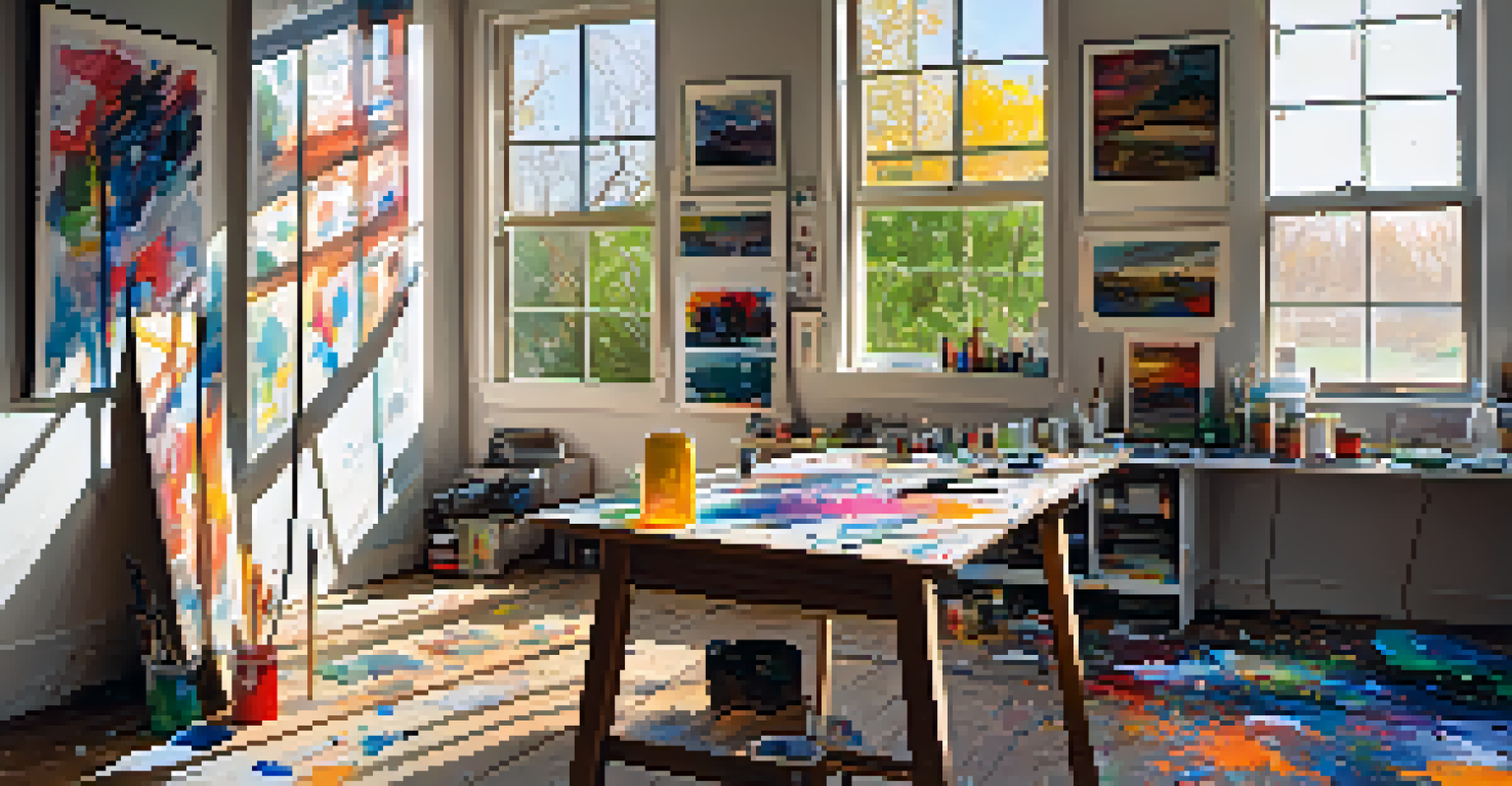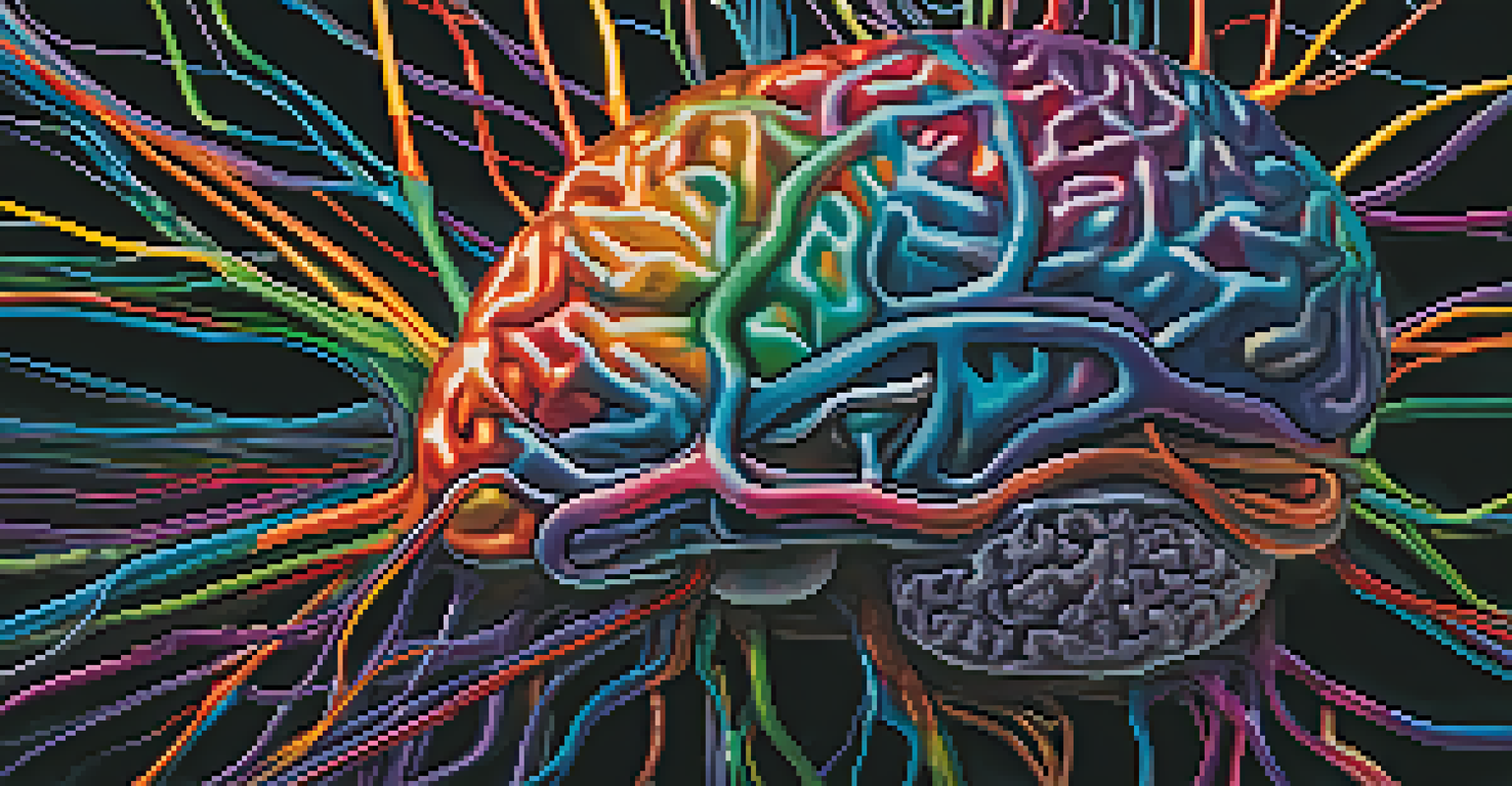How Hallucinogens Affect Cognitive Flexibility and Creativity

Understanding Cognitive Flexibility: What Is It?
Cognitive flexibility refers to our brain's ability to adapt to new information and switch between thinking about different concepts. Imagine it like a mental gymnast, easily flipping between routines as the situation demands. This skill plays a crucial role in problem-solving, allowing us to find creative solutions and navigate challenges effectively.
Creativity is thinking up new things. Innovation is doing new things.
Individuals with high cognitive flexibility can see multiple perspectives and adjust their thoughts accordingly. This adaptability is not just beneficial for everyday life; it’s also essential in artistic and innovative endeavors. In many ways, it enables us to embrace change and think outside the box, which is where creativity often thrives.
Hallucinogens, substances that alter perception and mood, are believed to impact this flexibility. By temporarily changing the way our brain processes information, these substances might enhance our ability to think divergently, leading to more creative outcomes. However, understanding the nuances of this relationship requires a deeper dive into how these substances affect brain function.
Hallucinogens: A Brief Overview
Hallucinogens include a variety of substances, such as LSD, psilocybin (magic mushrooms), and mescaline. These compounds can profoundly alter our sensory perceptions, thoughts, and emotions, often leading to experiences that feel transcendent or surreal. For many, the allure of these substances lies in their capacity to expand consciousness and alter reality.

While they are often associated with counterculture movements, recent research has highlighted their potential therapeutic benefits, particularly in treating mental health conditions. This renewed interest has sparked conversations about their role in enhancing creativity and cognitive flexibility, particularly among artists, musicians, and thinkers seeking new avenues of inspiration.
Cognitive Flexibility Explained
Cognitive flexibility enables individuals to adapt their thinking and problem-solving approaches, fostering creativity.
Understanding the effects of these substances requires careful examination of the brain's chemistry. By interacting with serotonin receptors, hallucinogens can disrupt normal neural pathways and promote unusual patterns of thought. This disruption may be the key to unlocking new ways of thinking and problem-solving.
The Science Behind Hallucinogens and Creativity
Research suggests that hallucinogens can enhance creativity by enabling more fluid thinking and making connections between seemingly unrelated ideas. For instance, a study found that participants under the influence of psilocybin performed better on creative problem-solving tasks. This suggests that these substances may create an environment where creativity can flourish.
The mind is everything. What you think you become.
One theory is that hallucinogens increase neural connectivity, meaning different regions of the brain communicate more freely. This interconnectedness can lead to novel associations and insights, much like how a web of ideas can lead to a brilliant innovation. The brain becomes a playground of creativity, where the usual boundaries of thought are blurred.
However, it’s essential to approach this topic with caution. While some individuals report heightened creativity during and after hallucinogen use, the experience can vary widely. Factors like dosage, setting, and individual differences play a significant role in determining whether the experience will be beneficial or detrimental.
Cognitive Flexibility: A Key Component of Creativity
Cognitive flexibility is not only about switching tasks; it's also about reframing issues and approaching problems from different angles. When we think of creativity, this ability to pivot and adapt is fundamental. Whether brainstorming ideas for a new project or solving a complex puzzle, flexible thinking often leads to innovative solutions.
Moreover, cognitive flexibility allows individuals to embrace ambiguity and uncertainty, traits that are often present during creative processes. This openness to new experiences and willingness to explore the unknown can lead to breakthroughs in thought. In fact, many artists and inventors credit their success to their ability to think flexibly and entertain unconventional ideas.
Hallucinogens and Creativity
Research suggests that hallucinogens can enhance creativity by promoting fluid thinking and increased neural connectivity.
By enhancing cognitive flexibility, hallucinogens may provide a unique tool for fostering creativity. However, it’s crucial to recognize that this effect can be temporary and context-dependent. Long-term changes in creative thinking may require more than just a single hallucinogenic experience.
The Role of Environment and Mindset
The context in which hallucinogens are consumed can significantly influence their effects on creativity and cognitive flexibility. A supportive and safe environment may enhance positive experiences, while a chaotic or uncomfortable setting can lead to anxiety and confusion. This highlights the importance of intention and preparation when exploring these substances.
Similarly, an individual's mindset going into the experience plays a critical role. Those who approach hallucinogens with curiosity and openness are more likely to experience meaningful insights. This highlights the idea that creativity isn’t just about the substance itself, but also about the mental framework and environment surrounding its use.
For this reason, many people advocate for guided experiences or therapeutic settings, where skilled facilitators can help navigate the journey. This combination of a positive mindset and a conducive environment can potentially maximize the benefits of hallucinogens for enhancing creativity and cognitive flexibility.
Potential Pitfalls of Hallucinogen Use
While hallucinogens show promise in enhancing creativity, it's essential to acknowledge the potential risks involved. Not everyone has a positive experience, and some may encounter anxiety, paranoia, or distress during their trip. These adverse effects can overshadow any creative benefits, making it crucial to approach their use responsibly.
Additionally, frequent use of hallucinogens might lead to reliance on these substances for creative inspiration, rather than developing one's innate creativity. This dependency can stifle personal growth and hinder the development of natural problem-solving skills. Creativity is a muscle that requires practice and nurturing, and relying solely on external substances may not be sustainable.
Importance of Environment and Mindset
The effects of hallucinogens on creativity are significantly influenced by the user's environment and mindset during the experience.
Ultimately, finding a balance is key. While hallucinogens can provide unique experiences that may enhance cognitive flexibility and creativity, they should be viewed as one tool among many. Exploring other avenues, such as mindfulness, meditation, or collaborative brainstorming, can also foster creativity without the risks associated with substance use.
Conclusion: A Balanced Perspective on Hallucinogens
As we delve deeper into the relationship between hallucinogens, cognitive flexibility, and creativity, it’s clear that these substances can offer exciting possibilities. They may temporarily enhance our ability to think outside the box, encouraging new connections and innovative ideas. However, this exploration must be tempered with caution and respect for the potential risks involved.
Understanding the science behind these effects can help us appreciate the complexity of human thought and creativity. It’s not simply about the hallucinogens themselves, but how they interact with our brains, environments, and mindsets. This holistic view underscores the importance of approaching creativity in a multifaceted way.

In conclusion, while hallucinogens may serve as a catalyst for creativity and cognitive flexibility, they are not a panacea. By nurturing our creativity through various means—be it through experiences with hallucinogens or other practices—we can unlock our full creative potential in a safe and healthy manner.